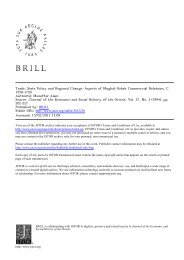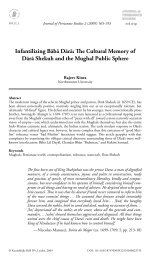The Mughals, the Sufi Shaikhs and the Formation of the Akbari ...
The Mughals, the Sufi Shaikhs and the Formation of the Akbari ...
The Mughals, the Sufi Shaikhs and the Formation of the Akbari ...
You also want an ePaper? Increase the reach of your titles
YUMPU automatically turns print PDFs into web optimized ePapers that Google loves.
FORMATION OF THE AKBARI DISPENSATION 171<br />
also recognized. Baqi-Bi1lah however contested <strong>the</strong>ir reading <strong>and</strong><br />
interpretation <strong>of</strong> <strong>the</strong>ir predecessors. He took up <strong>the</strong> case <strong>of</strong> Shaikh<br />
Nizam al-Din Auliya, since his practice was <strong>the</strong> most <strong>of</strong>t-cited evidence<br />
in support <strong>of</strong> musical practices, <strong>and</strong> remarked that in his malfuzat where<br />
Nizam al-Din discussed <strong>the</strong> legality <strong>of</strong> sama’, he appended <strong>the</strong> condition<br />
that <strong>the</strong> listener should be a true lover <strong>of</strong> God. This evidently meant,<br />
Baqi-Billah added, that he disapproved <strong>of</strong> its practice. True love <strong>of</strong><br />
God, Baqi-Billah added, required total <strong>and</strong> unqualified submission to<br />
<strong>the</strong> path (sunna) <strong>of</strong> <strong>the</strong> Prophet. A true follower <strong>of</strong> his path would never<br />
indulge in an act for which <strong>the</strong>re was no precedent in <strong>the</strong> life <strong>of</strong> <strong>the</strong><br />
Prophet. <strong>The</strong> Prophet never listened to music nor did he ever permit<br />
its performance. 102 <strong>The</strong> Indian <strong>Sufi</strong>s failed in getting at <strong>the</strong> correct<br />
meaning <strong>of</strong> <strong>the</strong> discourses in <strong>the</strong> texts composed in India too, as <strong>the</strong>y<br />
misunderstood <strong>and</strong> misinterpreted Ibn al-’Arabi <strong>and</strong> Simnani. Islam in<br />
India was to be as Baqi-Billah saw it, whatever its practice in <strong>the</strong> past.<br />
In all this obviously lay <strong>the</strong> critique <strong>of</strong> basis <strong>of</strong> <strong>the</strong> prevailing<br />
underst<strong>and</strong>ing <strong>of</strong> tasawwuf. ‘Our tariqa’, Baqi-Billah noted, ‘is based<br />
on three things: an unswerving faith (rusukh) in <strong>the</strong> truth <strong>of</strong> <strong>the</strong> beliefs<br />
<strong>of</strong> <strong>the</strong> Sunni community (ahl-i sunnat wa jama’at), knowledge, gnosis<br />
(agahi) <strong>and</strong> prayer (‘ibadat). Laxity in any one <strong>of</strong> <strong>the</strong>se throws one out<br />
<strong>of</strong> our tariqa’. 103 <strong>The</strong> principal duty <strong>of</strong> a seeker, according to him, was to<br />
follow <strong>the</strong> shari’a. ‘Correct beliefs’, he reiterated, ‘regard for shari’a <strong>and</strong><br />
sincere attention to God are <strong>the</strong> greatest wealth. No mysticism (zauq,<br />
wijdan) is comparable with this’. 104 Indeed, <strong>the</strong> ultimate aim for him<br />
was to achieve what <strong>the</strong> earlier shaikhs <strong>of</strong> his lineage characterized<br />
as musalmani. When a seeker asked him about its implications, he<br />
said: ‘Musalmani is <strong>the</strong> murad [<strong>the</strong> desired goal, but it] is difficult’. It<br />
is achieved only with divine grace, <strong>and</strong> is beyond <strong>the</strong> circle <strong>of</strong> human<br />
effort. To become a musalman is <strong>the</strong> very reality (haqiqa) <strong>of</strong> mysticism<br />
(ma’rifa). 105 In one <strong>of</strong> his letters, he elaborates on <strong>the</strong> question saying<br />
that beauty (jamal) <strong>and</strong> perfection (kamal) in a seeker follows from his<br />
submission (b<strong>and</strong>agi), which meant prayer, fasting, alms-giving, hajj,<br />
war with <strong>the</strong> infidels, regard for <strong>the</strong> rights <strong>of</strong> <strong>the</strong> parents <strong>and</strong> o<strong>the</strong>rs,<br />
<strong>and</strong> justice. 106<br />
102 Kulliyat-i Baqi-Billah, Section Malfuzat, pp. 42–3.<br />
103 Kulliyat-i Baqi-Billah, Section Malfuzat, p.25.<br />
104 Kulliyat-i Baqi-Billah, Section Malfuzat, p. 36.<br />
105 Kulliyat-i Baqi-Billah, Section Malfuzat, p.29 <strong>and</strong> Section Ruq’at, p.137.<br />
106 Kulliyat-i Baqi-Billah, Section Ruq’at, p.139.<br />
http://journals.cambridge.org Downloaded: 15 Feb 2011 IP address: 129.174.97.34






